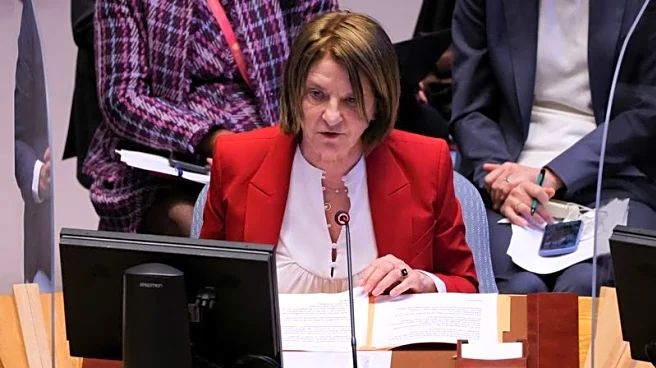What's Happening?
President Trump and Egyptian President Abdel Fattah el-Sisi are set to co-chair a peace summit in Sharm El-Sheikh, Egypt, aimed at ending the conflict in Gaza. The summit follows a ceasefire agreement between Israel and Hamas, which took effect on Friday. European leaders, including France's Emmanuel Macron and the UK's Keir Starmer, will attend the summit. The Wall Street Journal reported that Hamas has informed Israel of its readiness to release 20 Israeli hostages, potentially starting as early as Sunday. Humanitarian aid has begun flowing into Gaza, contingent on the ceasefire holding. The summit will include a signing ceremony for the 'Middle East peace plan,' although neither Israel nor Hamas will reportedly attend.
Why It's Important?
The summit represents a significant diplomatic effort to stabilize the region and potentially end hostilities in Gaza. The involvement of President Trump and European leaders underscores the international community's commitment to resolving the conflict. The release of hostages and the flow of humanitarian aid are critical steps in alleviating the humanitarian crisis in Gaza. The summit could lead to broader peace negotiations and influence U.S. foreign policy in the Middle East. Stakeholders such as Israel, Hamas, and regional powers stand to gain from a successful resolution, while failure could exacerbate tensions and instability.
What's Next?
Hamas is expected to release Israeli hostages in exchange for the liberation of Palestinian prisoners by Israel, as part of the ceasefire agreement. President Trump will travel to Israel to deliver a speech at the Knesset before joining the summit. The summit may pave the way for further negotiations and agreements between conflicting parties. The international community will closely monitor the situation, with potential reactions from political leaders and civil society groups influencing future diplomatic efforts.
Beyond the Headlines
The summit highlights the complex geopolitical dynamics in the Middle East, including the roles of major powers like the U.S. and Egypt. The inclusion of high-profile Palestinian prisoners in the exchange deal could have long-term implications for Israeli-Palestinian relations. The event also raises ethical questions about the treatment of hostages and prisoners in conflict zones. The peace plan's success or failure could impact regional stability and influence future U.S. foreign policy decisions.










